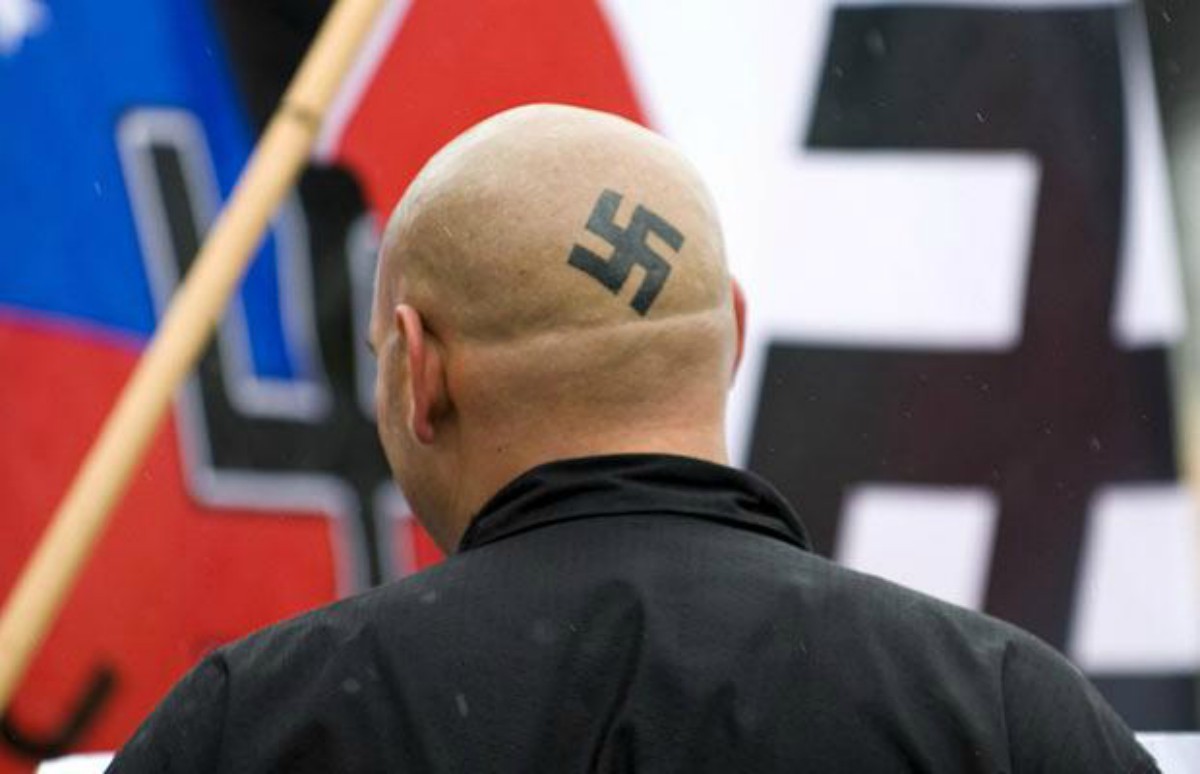Filed under: Anti-fascist, Editorials, Featured, Southeast

The following editorial was originally published in Where the River Frowns.
I’ve lived in Evansville for the last decade. I like it here. I like that the city is small. I enjoy the street culture and social abandonment of folks day-drinking in empty lots, singing loudly to themselves without embarrassment, or having public sex, and I enjoy folks’ inventiveness, though it’s brought on by overwhelming need– “the mother of invention.”
I moved here indirectly from Newnan, Georgia. I have to work this weekend, but if didn’t, I’d be back in Newnan, down by its old remodeled square, much the style of Franklin Street in Evansville (not the warehouse area where they house prison laborers but gentrified Lamasco where the suburbanites come into town for the weekend to get drunk amongst themselves). I’d be back south in physical opposition against the neo-Nazi rally.
I have been texting back and forth with my family members in Newnan about the rally and how the town is reacting to it. I say “town,” but Newnan and Coweta County where it sits have both tripled in population since I first arrived there. When we first moved there about thirty years ago, there was a four-way crossing with a single gas station and a grocery store called Thomas Crossroads that has since become big enough to be its own town. Though bigotry is often associated with a “small town mentality,” modern capitalism tries to hide it in sprawling “revitalization.” I think you’d have to consciously disregard a lot of poor and brown people to believe in that facade.
A CNN article about Newnan’s preparation for the upcoming rally, ”A Small City in Georgia is Fighting Back Against Neo-Nazis in a Novel Way,” is an example of just such a disregard. Similarly to Evansville, in Newnan, the poorest neighborhoods and much of the city’s black and brown population are within walking distance to Newnan’s commercialized downtown. But these groups of people, some of the Nazis’ primary targets both historically and presently, are not referred to at all in CNN’s article. Much like the cities of Newnan and Evansville themselves, CNN focuses on the business owners and the commercial district, celebrating capitalism and ignoring those the system is designed to exploit and exclude.
The article states, “Many shop owners decided [to] shutter their doors,” and continues, “It’s a big financial hit for these local businesses, so residents have decided to do something about it. They’re urging each other to go shop on Friday to make up for the drop in revenue.”
This is almost solely the article’s topic for its entire length. It does touch on one attempt to tactically oppose the Nazis: “One non-profit, Backstreet Community Arts, is asking kids to come to the city park and cover it with chalk drawings of hearts, rainbows and flowers. ‘It will be hard for the hate group to take serious video footage when a rainbow-colored unicorn is in the shot,’ the group said.” That is the only action mentioned in the article that isn’t about people shopping.
I assume many of the people taking part in these activities advocated by the city are well meaning and feel like they’re helping. But it’s comments like this text message from my sibling that lead me to think people are being naive and assumptive regardless of their intentions: “it isn’t that [Nazi] group that causes fear…it’s the 4-5 bus loads of the other group counter acting them that does…can’t remember they’re name.” Another person from Evansville and I were both trying to make plans to be on those buses; it wouldn’t have been the first time I’ve gone with people from Evansville to physically confront a public Nazi rally.
The “other group” likely refers to Antifa (short for “anti-fascist”), which has long been used as a name for people who network in active opposition against the organization of fascism. It is not a group, strictly speaking, but a field within which to organize. It has historically been comprised of working-class and counter-cultural folks who inhabit multiple categories of “other,” and there are plenty of angles from which to critique it, including its stereotypical masculine approach. However, when I was gathered with Antifa in Pikeville, Kentucky, against the neo-Nazis there, it was empowering and striking to be amongst a visibly varied and queered group of people to contrast the monoculture of the neo-Nazi cis white males and the local police. There is something essential about racism revealed in Newnan’s prioritized fear of “that other [unknown] group” as opposed to fearing what is known about Nazism. The Nazis’ platform is to preserve the existing order and to accelerate it. Newnan’s primary concern is the maintenance of order as well.
I’ll conclude by commenting on how CNN’s article starts, with its title. There is nothing “novel” about the way Newnan is responding to fascism and the resistance to it. It is quite common for the places around Nazi gatherings to close up, and for the media and state to villainize anti-fascists. Furthermore, downtown areas all over America are organized to keep people compulsorily shopping to uphold the structural flow of money to a white minority. From June 8th to 10th of this year, Evansville will host Indiana’s Republican Convention, a statewide gathering of supporters of a political party and administration that has openly welcomed white supremacists. They will celebrate the normalizing of our downtown through their platform of dispossessing people of color, the poor, and those self-organized. Our power is in our common experiences, public infrastructure, and collective, grassroots organizations built around acknowledging our differences and specific needs. Dissent isn’t “novel” either, but we need new strategies and tactics to bring down the rise of the far-right and all those who try to rise above the rest of us.
Editor’s Note: For more on the April 2017 neo-Nazi gathering in Pikeville, Kentucky, see “Opposition Builds Against White Nationalist Conference in Pikeville, Kentucky” and “My Weekend with the Neo-Nazis.”





